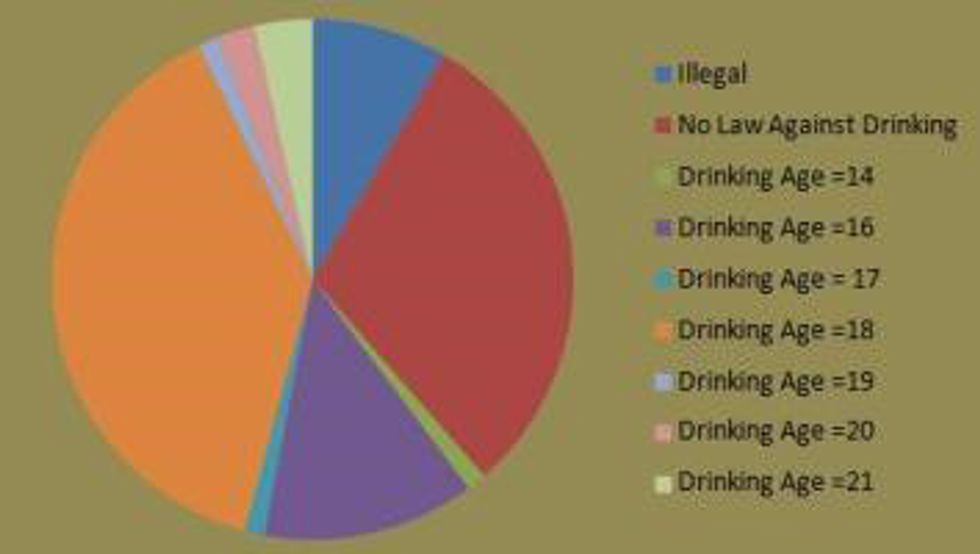College students across the nation are participating in an illegal activity every weekend. This activity is actually one of the most common social activities in America. Underage drinking and, more specifically, the drinking age in America is a passionate subject among many citizens. Many people in the college community are calling for the drinking age to be lowered to 18 years old. Opponents argue that lowering the drinking age will result in more underage binge drinking, that high school students will have easier access to alcohol, and that the Minimum Legal Drinking Age of 21 (MLDA 21) decreases traffic accidents that are caused by alcohol consumption. Proponents of lowering the legal drinking age to 18 argue that drinking in safer environments will result in less drinking in unsafe ones, parents are more responsible for safer alcohol consumption, and that people have the right to drink as legal adults. Proponents and opponents alike would also argue that proper education from youth’s parents would result in safer drinking habits. Through proper research it is evident that, coupled with higher parental involvement, the benefits of lowering the drinking age trumps the potential costs.
CONS:
A majority of Americans want to keep the drinking age right where it is and have legitimate arguments to back their side up. A 2007 Gallup poll revealed that 77% of Americans are against lowering the national drinking age (“most Americans”). The reasons behind a large amount of Americans being against lowering the national drinking age are pretty simple. Many opponents argue that drinking will become much more common and dangerous among the 18-20 year old demographic. Many European countries allow drinking at 18 or do not have restrictions at all, but that comes at a price. The European School Survey Project on Alcohol and Other Drugs “[revealed that] a majority of these countries have higher percentages of youth who report heavy alcohol use and drinking to intoxication than the United States” (Hanson). Opponents would argue that this trend would also occur in the United States if the drinking age were lowered.
Lowering the drinking age could also result in even younger teenagers gaining easier access to alcohol. Most underage college students have easy access to alcohol, so lowering the drinking age could give younger students easier access. Opponents argue that lowering the drinking age would “give high schoolers and even middle schoolers easier access to alcohol” (procon.org). It is already unsafe for underage college students to have access to alcohol, so giving that access to high school students will result in even more dangers.
Abolishing MLDA 21, opponents argue, would also be unsafe. Procon.org stated that “76% of bars have sold alcohol to obviously intoxicated patrons” and “about half of drivers arrested for driving while intoxicated (DWI) or killed as alcohol-involved drivers in traffic crashes did their drinking at licensed establishments.” Allowing the 18-20 year old demographic to legally go and buy alcohol at bars would only increase the number of people involved in alcohol related crashes. Opponents have legitimate arguments, but abolishing MLDA 21 has far more benefits than disadvantages. This is explained in the following paragraphs.
Pros:
Proponents argue that by lowering the drinking age, young adults will be drawn out of private residences, fraternity houses, and dorm rooms and into more open settings like bars, where they can actually be monitored more. There will be fewer scenes like the picture above and more scenes of groups of young adults spending time together at a bar. MLDA 21 has shown to decrease binge drinking “everywhere but on college campuses” (Washington Post). With MLDA 21, college students are being forced to drink in secret. So, on the occasion where they do drink, they celebrate and drink far too much. A Time article even points out that "forced alcohol consumption behind the closed doors of [dorms] and fraternity basements . . . [is] always unsupervised, done in secret and too often excessive. This style of drinking has no doubt been responsible for the alarming rise in rates of so-called 'binge' drinking seen at colleges" (Cloud). Many underage young adults want to drink alcohol, so when they cannot go to a bar they hide in a room and drink whatever they can because it might be the last chance for a while. Clearly, drawing young adults out of dorms or their homes and into bars or a more public setting will result in them drinking less and drinking safer.
Even though opponents of abolishing MLDA 21 say that it will result in more unsafe drinking among the 18-20 year old demographic, it is possible to monitor and reward responsible ones. John McCardell, a professor of history at Middlebury College, says that if the drinking age were lowered then the government could “license 18-year-olds--adults in the eyes of the law--to drink, provided that they've completed high school, attended an alcohol-education course (that consists of more than temperance lectures and scare tactics), and kept a clean record.” By going with Professor McCardell’s plan responsible 18 through 20-year-olds would be rewarded with the ability to purchase alcohol, while those who are irresponsible will have no choice but to wait. By lowering the legal drinking age, and by possibly only rewarding responsible young adults, drinking will be drawn out of private residences and fraternity houses and into more public setting such as bars where they will be monitored by far more people than just their drinking buddies.
One of the biggest ways to reduce unsafe drinking, regardless of the drinking age, is parental involvement. Parents have a heavy influence on their children’s drinking habits. Dr. Bray, president of the American Psychological Association, produced “research [that] showed that the children of parents who took a zero tolerance approach to underage drinking were more inclined to socialize with friends and peers who also consumed less alcohol” (Wilson). Children live with their parents during the first eighteen years of their lives, which means they are influenced by their parents for an incredible amount of time. Dr. Bray’s research also showed that "parents who monitor children's behavior tend to have kids who drink less. That involves keeping up with where they are at, and who their friends are” (Wilson). Dr. Bray’s research shows that if parents care about their children, watch after them, and tell them the dangers of underage and binge drinking that they can single-handedly reduce the amount of underage and unsafe drinking.
The biggest argument for lowering the drinking age is that drinking should simply be a basic right for an adult, which includes 18-year-olds. As seen in the picture above, the vast majority of countries in the world allow for drinking at 18 years old or even younger. America is one of the few countries that makes adults wait until they are 21 to legally be able to purchase and consume alcohol. If America is the supposed “leader or the free world” and the “land of the free,” why would a basic right like being able to buy and purchase alcohol be restricted?
Another argument for the freedom to alcohol is that an eighteen year old can sign up for the military and risk their lives overseas, but they are not allowed to purchase even a single beer. A Los Angeles Times article reported that “in Alaska, a bill was . . . introduced that would allow active members of the military to drink at the age of 18, with the rationale that if they're old enough to fight and die for their country, they're old enough to have a beer” (Ogilvie). It makes plenty of logical sense. If someone can risk being captured, tortured, shot, or blown up and if someone can leave their family for years at a time, then they should have the right to simply purchase a beer. Proponents argue that drinking alcohol is a basic right that all legal adults, especially military members, should have.
Another big reason to why MLDA 21 should be abolished is the risk that just about every college student takes when paying for school. Many college students have to take out massive loans, risking their financial security and future, just for the chance, not guarantee, to get a better job in the future. Glenn Harlan Reynolds, a professor of law at the University of Tennessee, points out the “absurd phenomenon of colleges encouraging students to go into six-figure debt--which can't be discharged in bankruptcy--but forbidding them to drink on campus because they're deemed insufficiently mature to appreciate the risks” (Reynolds). If college students are mature enough, or are forced to be mature enough, to go into six-figure debt at 18, it is very reasonable to assume that they are mature enough to purchase a three dollar beer.
And maturity is not always related to age. A lot of a young adult's maturity level comes from their upbringing. A young adult with immature parents is most likely going to be less mature than a young adult of the exact same age who is raised by mature parents. Drinking as an adult is a right that should be enjoyed by all adults. It should be a right on an equal playing field as being able to vote, buy tobacco products, and join the military. People’s personal opinions of MLDA need to be put aside. It should not be kept or repealed based on if people do or do not like it. Drinking at 18 is a basic human right that should be allowed immediately.
Repealing MLDA 21 will likely have consequences. If young adults are not educated properly then binge drinking among 18 through 20-year-olds could rise. Binge drinking is a problem among young adults in Europe, so without proper alcohol education and awareness it is probable that the binge drinking problem could also occur in America.
Another potential problem is that high school and middle school students will possibly gain easier access to alcohol with the repeal of MLDA 21. Underage young adults already have easy access to alcohol from 21-year-olds, so teenagers could possibly get easier access from 18-year-olds. Opponents will also argue that, by lowering the legal drinking age, the number of alcohol-related auto accidents will rise.
Again, all of these problems can easily be fixed. If parents take an upfront approach to teaching their children about the dangers of alcohol most, if not all, problems with lowering the drinking age can be abolished. Parents increasing their children’s alcohol education, partnered with young adults drinking in safer environments, and the basic freedom to buy alcohol is enough to outweigh any potential costs to lowering the drinking age. By drawing young adults out of fraternity houses and dorm rooms they will be drawn to bars where bartenders, other patrons, and even police will be watching to make sure that they do not drink too much. People hear far less stories in the news about a person drinking themselves to death at a bar than in secret on a college campus. Most importantly, however, the freedom to purchase and consume alcohol should be a basic right for all legal adults. If 18-year-olds can gamble (in certain states’ dry casinos), buy tobacco products, join the military, vote, and go into six-figure debt just to go to earn a degree then they should have the right to be able to buy a beer on a Friday night. Are there dangers with allowing 18 through 20-year-olds to purchase and consume alcohol? Yes, but with parental involvement those problems can be largely mitigated. The benefits of lowering the drinking age, however, far outweigh the potential costs. It is time for a change.

























